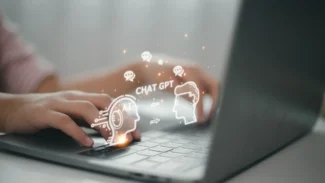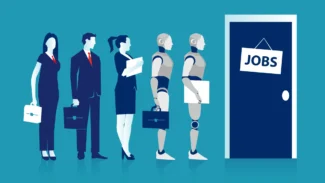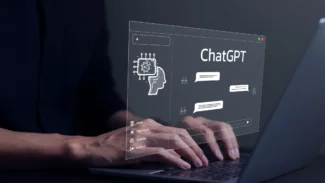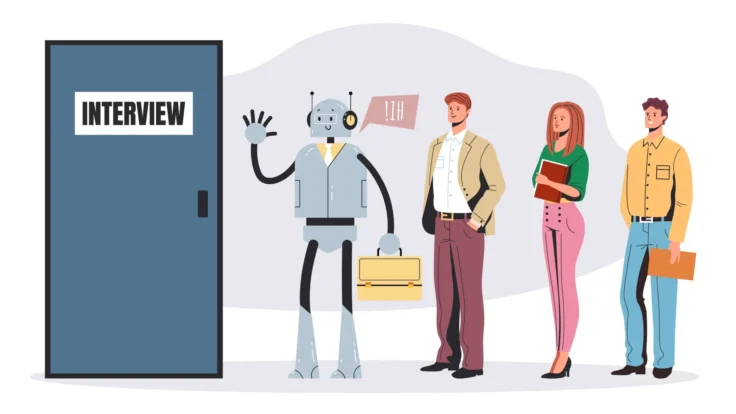Whether your application has passed the initial phase or you haven’t even submitted your resume yet, thinking about the eventual job interview can be nerve-wracking!
That’s why it’s always important to prepare yourself the right way.
For example, did you know that you can do your interview prep with AI?
Artificial intelligence has transformed from a concept into a practical tool that enhances our daily tasks, including writing resumes with ChatGPT and using AI for your job search.
In this guide, we will show you:
- Why you should take advantage of ChatGPT to sharpen your interview skills
- Some of the best ChatGPT prompts to come up with interview questions
- Steps for creating an interview with ChatGPT
- Tips for making questions specific to your position
Keep reading to make sure you are 100% prepared for the most common questions during your interview and any curveballs a hiring manager may throw your way.
What Is ChatGPT, and Why Use AI for Job Interview Preparation?
ChatGPT is an AI language model developed by OpenAI. It is designed to produce human-like text responses based on the prompts it receives. It uses advanced machine-learning techniques to understand and produce text.
ChatGPT is great for coming up with practice questions and answers, making it your personal mock interview AI tool. Here’s exactly why it’s so helpful:
- Allows you to practice: ChatGPT allows you to rehearse answers to a variety of interview questions, from highly technical to behavioral ones.
- Gives you specific feedback: As you interact with ChatGPT, it learns from your responses. This means it can give you increasingly specific advice on how to improve your answers.
- Prepare questions for your interviewer: ChatGPT assists you in crafting questions you might ask your interviewer, rounding out your prep experience.
That’s how using AI can significantly improve your interview preparation. It provides a versatile and dynamic way to enhance your interview skills.
In addition, you can use an AI resume builder to ensure all your qualifications are as detailed as possible.
According to a study, 70% of workers lie on resumes, which leads to negative experiences during the interview process.
Having a fine-tuned resume can help guarantee your interview will be a positive one!
Advanced Techniques for AI Interview Prep
Enhancing your job interview preparation with ChatGPT involves advanced techniques and customization to tailor responses to specific scenarios.
- Advanced prompts: Use complex prompts to create specific interview situations.
- Industry keywords: Integrate industry-specific keywords like “agile methodology,” “email marketing,” or “project management skills” into your prompts.
- Vary interview types: Change between behavioral and technical questions. After a technical question, switch to a behavioral prompt.
These strategies enhance the authentic feel of your practice sessions, preparing you to master different interview styles effectively.
Best ChatGPT Prompts for Interview Questions
Crafting well-thought-out prompts is key to extracting the most effective and relevant interview questions from ChatGPT or any type of AI tool, including Gemini.
Here are some examples of prompts that can help you generate useful interview questions for various types of roles, such as for an Economist or any other position:
- General role inquiry: “Generate five common interview questions for a [Position] role.”
- Behavioral focus: “What are some behavioral interview questions to assess teamwork for a [Position]?”
- Technical proficiency: “List technical questions to evaluate programming skills for a [Position].”
- Leadership assessment: “Provide questions that explore leadership qualities in a [Role] candidate.”
- Industry-specific: “What interview questions should I ask a candidate applying for a [Position] to gauge their industry knowledge?”
Using these prompts with ChatGPT can help you prepare targeted questions that are suited to the specific demands and challenges of the job you’re applying for or hiring for.
Examples of AI-Engineered Interview Questions and Answers
Once you’ve used the prompts you think work best for your situation, you should be able to get questions for your preparation.
Here are some examples that you can get with the right prompt.
- Describe a time when you had to analyze a large amount of data. What approach did you take?
- How do you ensure ethical practices in your professional responsibilities?
- Can you discuss a significant project you spearheaded? What was the outcome?
- What strategies do you use to stay current with developments in your field?
- How do you manage conflicts within your team, especially when making critical decisions?
Once, you’ve gotten the questions from ChatGPT, you can now come up with your answers.
Below are a few examples of prompts and responses for different professions that you can use as inspiration to create responses to your interview questions.
Prompt :
Provide a detailed answer to an interview question about handling large amounts of data.
Sample answer:
In my previous role as a market analyst, I regularly dealt with large datasets. I used SQL to manage the data effectively and Excel for analysis. My approach was systematic: first, ensuring data cleanliness, then performing exploratory data analysis to understand trends and outliers. This method helped me provide insights that increased our campaign effectiveness by 15%.
Prompt 2:
Generate an answer about maintaining ethical practices in professional tasks.
Sample answer:
As a financial advisor, maintaining ethical practices is paramount. I adhere strictly to industry standards and legal regulations. I ensure transparency with my clients about all investment risks and returns. Regularly attending workshops on ethical practices in finance keeps me updated and vigilant.
Prompt 3:
Describe leading a significant project with positive outcomes.
Sample answer:
As a project manager, I led the deployment of a new IT system that streamlined our operational processes. I coordinated a team of 20, aligning our efforts with strategic goals. We completed the project three weeks ahead of schedule, and under budget, and it resulted in a 30% improvement in workflow efficiency.
Prompt 4:
What strategies do you use to keep updated with your field?”
Sample answer:
As a teacher, I keep myself updated by attending professional development seminars, participating in webinars, and engaging with online communities of educators. This helps me incorporate the latest educational technologies and pedagogical strategies into my classroom.
Prompt 5:
How do you handle team conflicts during critical decisions?
Sample answer:In my experience, open communication and stakeholder engagement are key to managing team conflicts. For example, during a budget dispute, I facilitated a meeting to discuss each department’s priorities and constraints. This approach allowed us to arrive at a compromise that respected all viewpoints.
Setting Up Your Practice Interview with ChatGPT
Now that you understand how to get your ChatGPT-generated questions and answers, here’s a step-by-step guide on how to set up a practice session.
With this guide, you can get the most out of your interactions and prepare for your interview.
1. Optimize your resume and cover letter
Firstly, before starting to come up with your practice interview, it’s a good idea to update your resume and cover letter with AI. This allows you to list all your KPIs and achievements in one place, which you can study and then highlight during your interview.
2. Define the job role and requirements
Once your resume and cover letter are updated, begin by clearly defining the job role for which you are preparing. Input this information into ChatGPT, along with specific requirements or skills listed in the job description.
3. Start your mock AI interview
Ask ChatGPT to start a mock interview. Use a prompt like: “Begin a mock interview for a [job title] position.” ChatGPT will then simulate an interviewer and pose questions typical for the role.
4. Respond to ChatGPT’s interview questions
You can either come up with responses with the help of ChatGPT or answer each question as if you were in a real interview.
This practice helps you put together thoughtful responses. You can also ask ChatGPT to repeat or rephrase questions if needed.
5. Request feedback on your answers
If you’ve come up with your own answers, after responding, ask ChatGPT for feedback. For example, “How can I improve my answer to the last question?” ChatGPT can provide suggestions to enhance the content, delivery, or relevance of your responses.
6. Refine your answers
Based on the feedback or the output that ChatGPT has given you, fine-tune your answers.
You can experiment with different responses to see how variations might strengthen your answers. This step is crucial for developing the most effective and persuasive answers possible.
7. Repeat and get better
Continue the mock interview process by going through several rounds of questions and feedback. This repetition will improve your confidence and ability to handle different types of interview questions.
Key Takeaways
Whether you are going to use ChatGPT for LinkedIn optimization, resume building, or interview preparation, you can make your job search easier.
ChatGPT will help with your interview preparation if you remember these important tips:
- Employ well-defined prompts to generate the most accurate and relevant responses
- Use ChatGPT to analyze job descriptions and tailor your preparation accordingly
- Take advantage of AI to craft and refine your cover letter and resume
- Customize the AI-generated content to suit your specific needs and scenarios
By using AI and resume tools like customizable templates, you’ll set yourself up for a successful interview!
Related Posts





